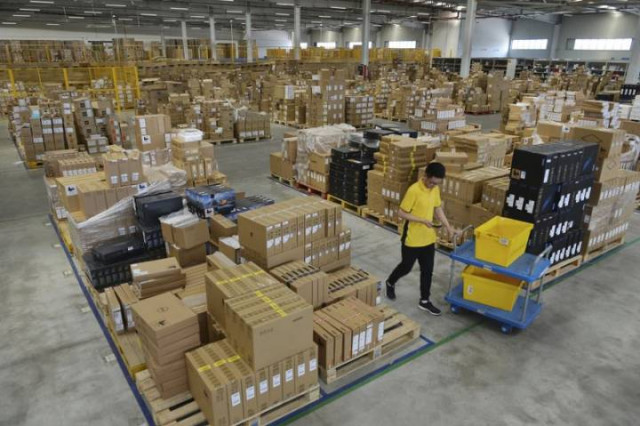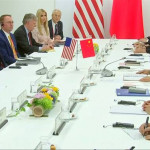 Ukraine reports 5,276 new COVID-19 cases
Ukraine reports 5,276 new COVID-19 cases
 Zelensky: Every third Ukrainian considers road construction one of greatest achievements of 2021
Zelensky: Every third Ukrainian considers road construction one of greatest achievements of 2021
 Ukraine ready to implement Minsk agreements, but Russia's desire needed - Yermak
Ukraine ready to implement Minsk agreements, but Russia's desire needed - Yermak
 Michel: EU unanimously agree to roll over economic sanctions against Russia
Michel: EU unanimously agree to roll over economic sanctions against Russia
 Actions by Ukraine's partners will help prevent worst-case scenario - Zelensky
Actions by Ukraine's partners will help prevent worst-case scenario - Zelensky
 COVID-19 in Ukraine: Health officials confirm 8,899 daily cases as of Dec 17
COVID-19 in Ukraine: Health officials confirm 8,899 daily cases as of Dec 17
 Macron tells Zelensky he declared support for Ukraine in call with Putin
Macron tells Zelensky he declared support for Ukraine in call with Putin
 Zelensky, Scholz discuss gas transit through Ukraine after 2024
Zelensky, Scholz discuss gas transit through Ukraine after 2024
 Ukraine ready for any format of talks with Russia - Zelensky
Ukraine ready for any format of talks with Russia - Zelensky
 Ukraine’s only journalist in Russia facing extremism charges - lawyer
Ukraine’s only journalist in Russia facing extremism charges - lawyer
 PM Shmyhal: First two applications for investment projects worth $96 million filed
PM Shmyhal: First two applications for investment projects worth $96 million filed
 Zelensky, PM of Italy discuss security situation around Ukraine
Zelensky, PM of Italy discuss security situation around Ukraine
 President signs off State Budget 2022
President signs off State Budget 2022
 London considering all options for responding to Russia's aggression against Ukraine
London considering all options for responding to Russia's aggression against Ukraine
 Putin, Biden to hold another round of talks
Putin, Biden to hold another round of talks
 Some 260,000 Ukrainians “victims of human trafficking” over 30 years - prosecutor general
Some 260,000 Ukrainians “victims of human trafficking” over 30 years - prosecutor general
 Ukraine plans to create center to protect energy infrastructure from cyber attacks
Ukraine plans to create center to protect energy infrastructure from cyber attacks
 No clear idea so far when Normandy Four top diplomats set to meet - German Ambassador
No clear idea so far when Normandy Four top diplomats set to meet - German Ambassador
 Ukraine receives EUR 600M in macro-financial assistance from EU
Ukraine receives EUR 600M in macro-financial assistance from EU
 Zelensky holds phone conversation with PM of Israel
Zelensky holds phone conversation with PM of Israel
 Ukraine sets new daily COVID vaccination record
Ukraine sets new daily COVID vaccination record
 MFA: European Union has not yet removed Ukraine from list of safe countries
MFA: European Union has not yet removed Ukraine from list of safe countries
 Kyiv records 1,023 new COVID-19 cases, 29 deaths
Kyiv records 1,023 new COVID-19 cases, 29 deaths
 G7 ambassadors welcome adoption of law on NABU status
G7 ambassadors welcome adoption of law on NABU status
 Ukraine can increase Covid vaccination rates to 1.5M a week – Liashko
Ukraine can increase Covid vaccination rates to 1.5M a week – Liashko
China’s economic growth slowed to its lowest level in a decade in the latest quarter, adding to pressure on Chinese leaders as they fight a tariff war with Washington.
The world’s second-largest economy grew 6.2 per cent over a year ago in the three months ending in June, down from the previous quarter’s 6.4 per cent, government data showed Monday. That was the lowest level since the first quarter of 2009 in the aftermath of the global financial crisis.
“The trade war is having a huge impact on the Chinese economy,” said Edward Moya of OANDA in a report. “As trade negotiations struggle for meaningful progress, we are probably not near the bottom for China’s economy.”
Chinese leaders have stepped up spending and bank lending to shore up growth and avert politically dangerous job losses. But they face an avalanche of unexpectedly bad news including plunging auto sales as they fight with President Donald Trump over Beijing’s technology ambitions.
The economy faces a “complex environment both at home and abroad,” the National Bureau of Statistics said in a statement.
Weaker Chinese activity has global repercussions. This country is the biggest export customer for its Asian neighbours and a major market for global suppliers of food, mobile phones, industrial technology and consumer goods.
Growth in retail sales slowed to 8.4 per cent in the first half of 2019, down 0.1 percentage points from the first quarter, the government reported. Growth in factory output decelerated to 6 per cent in the first half, down 0.1 percentage points from the first quarter.
Auto sales, reported earlier, fell 7.8 per cent in June, extending a yearlong contraction in the industry’s biggest market. Chinese exports to the United States fell 7.8 per cent in June from a year, depressed by Trump’s penalty tariff hikes.
The fight between Beijing and Washington, the two biggest global traders, has disrupted sales of goods from soybeans to medical equipment, battering exporters on both sides and rattling financial markets.
Trump and Chinese President Xi Jinping agreed last month to resume negotiations. But economists warn the truce is fragile because the two sides face the same array of disagreements that caused talks to break down in May.
Beijing is pumping money into the economy through higher spending on building highways and other public works. That has shored up growth but set back efforts to reduce reliance on investment, which has pushed debt to levels that prompted credit rating agencies to cut China’s credit rating.
Investment in factories, real estate and other fixed assets rose 5.8 per cent in the first half of the year, up 0.2 percentage points from the first five months, according to the NBS.
Credit growth has accelerated to dangerously high levels, according to Iris Pang of ING. She said that suggests the economy “would be deteriorating” without stimulus.
“This worries us,” she said in a report Friday.













































































































































